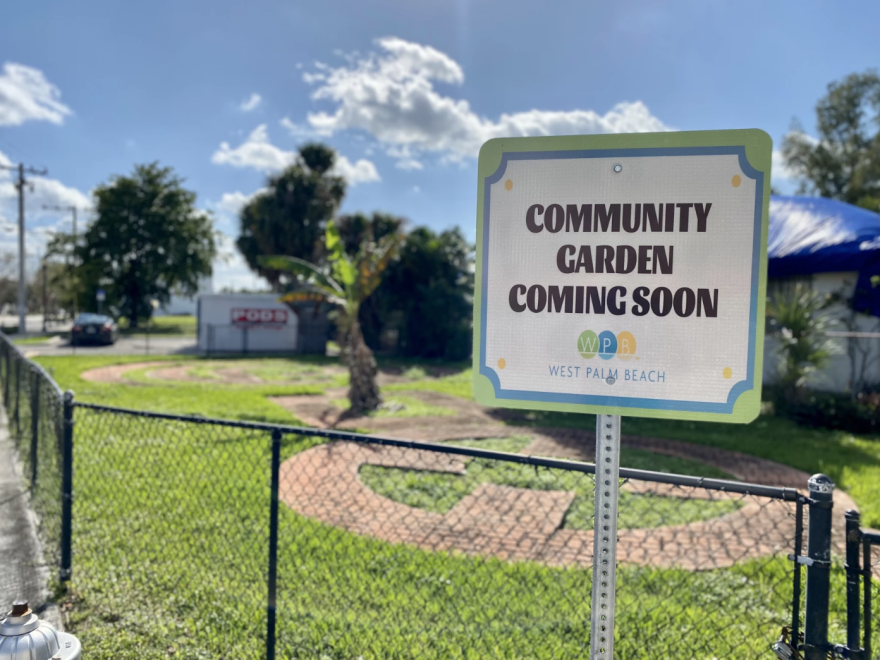Despite downtown West Palm Beach's reputation for its flourishing economic growth and development, people in low income communities just 10 minutes north of the 'Wall Street South' live in a food desert — where families have limited access to affordable, fresh fruits and vegetables.
As a result, the city partnered with Florida A&M University — the historically Black university based in Tallahassee — to establish three community gardens in the historic Northwest neighborhoods.
Now, after more than a year of preparations, city officials alongside FAMU and the US Department of Housing and Urban Development are celebrating the opening of one of the three farms Wednesday in Coleman Park.
Vonda Richardson, the executive director of FAMU's Cooperative Extension Program, said the gardens will also serve as agricultural training sites. It may not solve the food desert problem, but it could tap into the rising interest in wellness and healthier food habits.
“It's more than just the three gardens. And so our approach is to look at it a little more comprehensively, teaching not only how to grow it, but how to eat it — how it's nourishing for the body,” Richardson said.
The urban farms, as part of a memorandum of understanding with the city, will be located at Coleman Park Community Center, the Gloria Y. Williams Multicultural Center in Pleasant City and Phipps Park on South Dixie Highway.
In West Palm Beach, 17% of the population lives below the poverty line, compared with 11% for Palm Beach County, according to the US Census.
Richardson, who grew up on a farm in her native Georgia, told WLRN the presence of a public community garden can affect how people view their own food resource needs, shift their financial budget toward healthier food selections and establish fruitful connections with their neighbors.
“The impact can be tremendous. People have lost the art of growing food for themselves. When I was growing up, people had little small gardens in their backyard or they had something growing in a pot on the porch,” Richardson said. “It may have only provided a meal, but it was that meal that they didn't have to go out and spend money on.”

From young adults to seniors, the community garden aims to provide a wealth of educational opportunities and new green thumb experiences for communities that traditionally may not have had access to it. FAMU plans to work with nearby schools and after-school programs to better engage the youth about the importance of farming, particularly in concentrated urban spaces.
Through its established research and technical assistance, FAMU's Cooperative Extension Program has built youth development programs with cities and community-based organizations across the state. The community garden in West Palm Beach is its first agriculture and nutritional training program in South Florida.
Richardson said the three community gardens aren't large scale agricultural sites. Some of the plots within them will be as small as 10x10 — which are still “pretty decent-sized areas for one person to manage."
“They're space for in-ground planting, their space for raised beds, where we have boxes where you can have compost and plant in boxes. And then there's also space where we can do probably some vertical or some container type,” Richardson said. She explained that what matters most is residents’ ability to maximize their educational potential and be able to grow healthy, resourceful food on their own.

But will the food be sold?
Program officials are leaving that up to community members to decide. Richardson said an advisory committee will oversee FAMU’s community gardens with a full-time agricultural expert involved in the planting process but there are no rules prohibiting the sale of the produce.
Richardson said the gardens in West Palm Beach’s food desert may help folks who lack proper transportation and can't shop at healthy grocery stores that are often more than a mile away from their homes.
“What I want the community to do is to embrace the opportunity to be collaborative, knowing that it is a partnership and that we're here to serve and really work together," she said.
The news of the gardens came shortly after West Palm Beach’s controversial closing of Henrietta Bridge Farm in the middle of the growing season in 2021. But there have been a handful of urban farms putting down roots around Palm Beach County, from the non-profit Urban Farm and Restorative Garden in Riviera Beach to African drum circles and vegan food options held at a Black-owned farm in Loxahatchee.






